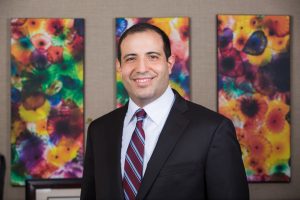The Doctor Is In
 Friends’ social media confessions, celebrities opening up about their troubles conceiving and popular entertainment increasingly addressing the very real struggles of trying to get pregnant have all, in recent years, helped diminish the taboo of talking about infertility.
Friends’ social media confessions, celebrities opening up about their troubles conceiving and popular entertainment increasingly addressing the very real struggles of trying to get pregnant have all, in recent years, helped diminish the taboo of talking about infertility.
But as helpful as it is to have more resources and avenues for connecting with others who understand that pain, those struggling to reach the milestone of a viable pregnancy are still living with the seemingly endless heartache of being denied the baby they dream of holding.
While each individual’s journey is unique, the team at Reproductive Medicine Associates (RMA) of Florida, the nationally renowned fertility clinic’s first location in the Sunshine State, knows that the goals are the same: to help those seeking treatment deliver a healthy baby.
Medical Director Dr. George Patounakis is proud of how RMA utilizes cutting-edge tech and scientific processes to help patients achieve viable pregnancies with a success rate that’s nearly 20% higher than the national average.
“Our lab technology, how we culture embryos, how we do our IVF (in vitro fertilization), all that together plays into our higher success rates,” he says.
Among those procedures is PGT-A, a genetic test that screens IVF embryos for chromosomal abnormalities prior to their uterine transfer, which Dr. Patounakis says is a safe and effective pathway to fertility.
“PGT-A allows us to test embryos and see which ones are chromosomally normal—those with the best chance of becoming a baby in your arms,” he explains. “When we have a whole bunch of embryos that look pretty good, it allows us to see which ones actually are good. That allows us to select an embryo for transfer.”
Utilizing a single-embryo transfer minimizes the potential for a planned single pregnancy to turn into the surprise of multiple fertilized embryos.
“Instead of playing a numbers game and putting back more than one embryo to try for at least one that’s normal, we just put back one that has a higher chance of making it to a live birth,” Dr. Patounakis continues. “That allows us to get there faster and do it more safely. By transferring only one embryo at a time, you’re reducing the chances of twins or triplets. That’s a much safer pregnancy for the babies and for the mom.”
RMA serves as both a private IVF clinic and a facility that “does a large amount of research in fertility treatments.” Its commitment to both undertakings yields greater chances of successful outcomes for patients, as well as a clearer understanding of what works best for the RMA team.
“We have the volume of a large private practice, and then we take that volume and can apply that to the research that’s being done to answer clinically relevant questions,” says Dr. Patounakis. “Basically, that translates to higher rates of taking babies home, higher chances of live births.”
Having a national network of coast-to-coast RMA facilities to tap into also helps the Florida location bolster its own findings with shared breakthroughs and new insights from their peers in New Jersey, Pennsylvania and California.
“When we’re doing research across the network, we’re always going to be the first ones to have experience with a new technique or approach because we’re the ones who developed it first,” he says. “Even once that research is published, we’ll have much more experience right off the bat with it, which gives us an advantage.”
Dr. Patounakis says that means RMA patients benefit from not only safer fertility treatments but also speedier results. “Generally, as soon as we have the data that gets published from our research studies, at the same time we’re deploying those practices at all our clinics. It’s a much faster pipeline for getting research to the bedside.”
The journey from infertility deferring dreams of parenthood to the birth of a healthy baby is an emotional one, which is why RMA’s team endeavors to support their patients’ mental health just as much as their reproductive health.
“The emotional support element is so important,” says Dr. Patounakis. “If patients get emotionally burned out during treatment, then they’re going to stop. And if they stop doing treatments, there’s no way for it to work. By offering that emotional support, you’re allowing them to keep pushing through and giving the treatments
a chance.”
And the doctor is always in to allay whatever fears come up while “the treatments do their thing.”
“When a patient is here, even if it’s bloodwork and I’m not seeing them directly, I’ll just catch them in the hall to ask how they’re doing, or they know they can stop in and ask me a quick question,” he says. “They feel like they’re not alone that way. I think that offers patients a lot of comfort when they know they can always come to me.”
Reproductive Medicine Associates of Florida
Serving Central Florida
400 Colonial Center Parkway,
Suite 150, Lake Mary
(407) 804-9670 | RMANetwork.com









